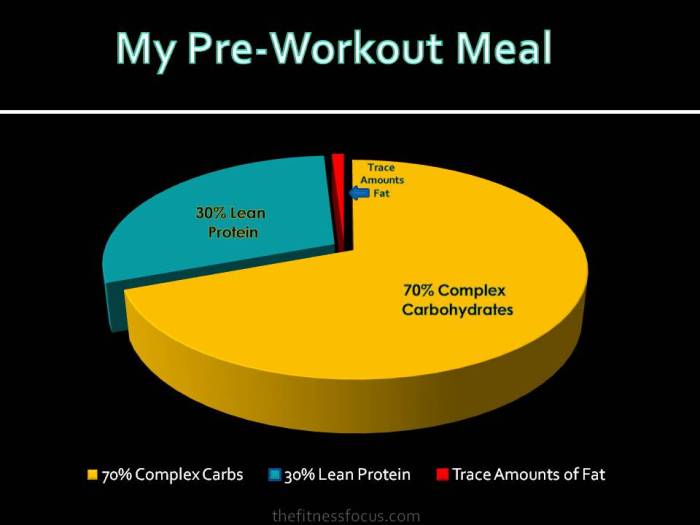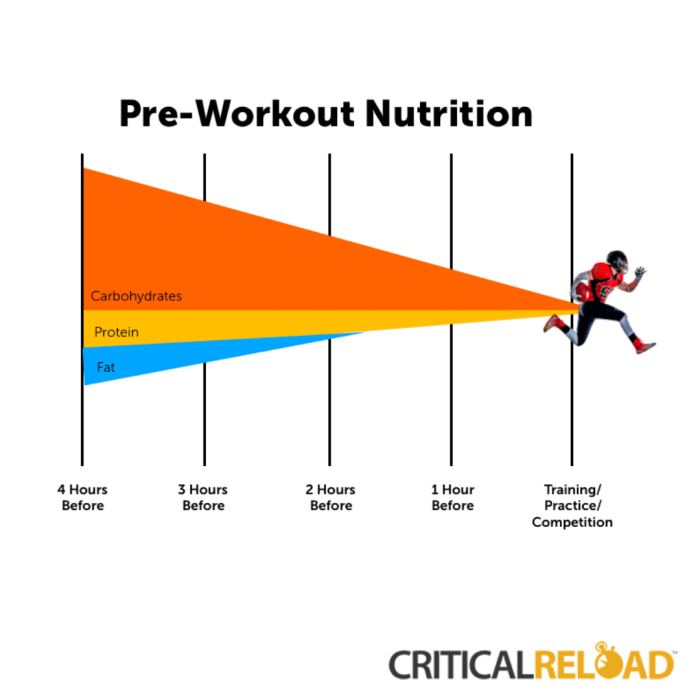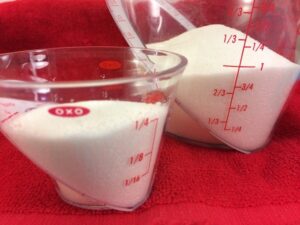
Pre-workout nutrition is like the opening act at a concert; it sets the tone and gets the crowd ready for the main event—your workout! Imagine fueling your body with the right nutrients that not only power you through those grueling sets but also make you feel like a superhero. In this high-energy guide, we dive into the magical world of macronutrients, optimal food choices, and timing your meals so that you can unleash your inner fitness beast, all while keeping your taste buds happy.
From the importance of carbs and proteins to how pre-workout meals can be a game changer for individuals with specific health conditions, we’ll cover a buffet of nutritional strategies tailored for various fitness goals. Whether you’re looking to bulk up, manage weight, or simply elevate your mood before a sweat session, we’ve got the scoop to ensure your pre-workout is as exciting as a new gym crush.
Pre-workout Nutrition Essentials

Every workout warrior knows that the secret sauce for success isn’t just the sweat and tears shed in the gym; it’s the proper nutrition before the grind. Pre-workout meals are the unsung heroes of exercise. They fuel your body, sharpen your focus, and set you up for a triumphant gym session. Let’s delve into the macronutrients that form the backbone of these meals and discover the best foods to fuel your fitness fire.
Importance of Macronutrients in Pre-workout Meals
Macronutrients are the superstar trio of nutrition: carbohydrates, proteins, and fats. Each plays a crucial role in prepping your body for that inevitable showdown with the squat rack. Carbs are your quick energy source, proteins help repair those muscles, and fats provide a steady fuel supply. Without the right balance of these nutritional titans, your workout could feel more like a stroll through a field of daisies than an intense session at the gym.
“The right macronutrient ratio can be the difference between a bench press and a bench rest.”
Optimal Foods to Consume Before a Workout
Selecting the right foods can turn your pre-workout meal into a feast fit for a fitness king or queen. Here are some of the best options to consider that combine taste with performance enhancement:
- Oatmeal: The classic hero, loaded with complex carbs that release energy slowly and steadily, keeping you fueled throughout your workout.
- Bananas: Often dubbed the “nature’s energy bar,” this fruit packs a potassium punch and is easy on the stomach.
- Greek Yogurt: A creamy delight that serves as a protein powerhouse, it helps repair muscles while keeping you satisfied.
- Chicken Breast: Lean, mean protein machine! Perfect for muscle repair and growth, it’s best enjoyed with a side of sweet potatoes.
- Nuts: These little nuggets are packed with healthy fats and proteins. A handful can provide sustained energy without weighing you down.
Each of these choices can contribute to a powerful workout experience, making your muscles feel as strong as a superhero’s.
Timing of Meals in Relation to Workout Performance
When it comes to pre-workout nutrition, timing is just as critical as the food itself. Eating too close to your workout can lead to discomfort, while waiting too long can leave you without the necessary energy. Generally, aim to consume your pre-workout meal about 1-3 hours before you start sweating like a fountain. This window allows your body to digest and convert the nutrients into usable energy.
“Timing your meals is just as important as selecting the right foods. It’s the secret handshake of the fitness world.”
To optimize your performance, experiment with meal timing to find what works best for your body. Some may prefer a hearty meal, while others might thrive on a lighter snack. Remember, the key is to listen to your body and adjust accordingly. So before you hit the gym, make sure you are armed with not just willpower, but the right nutrients at the right time!
Pre-workout Nutrition and Specific Health Conditions
When it comes to pre-workout nutrition, it’s not just about the energy boost and muscle fuel; it’s about tailoring those nutrients to fit individual health conditions. Just like a superhero needs a unique battle strategy based on their nemesis, individuals with certain health conditions require a specialized approach to their pre-workout meals. So let’s dive into the magical world of pre-workout nutrition where we cater to asthma warriors, autism champions, and back pain battlers.
Pre-workout Nutrition Considerations for Individuals with Asthma
For individuals with asthma, the importance of pre-workout nutrition goes beyond just feeling pumped. A well-thought-out meal plan can help keep airways clear and breathing easy—like a gentle breeze instead of a gusty hurricane. Here are some key considerations for asthma-friendly fueling:
- Hydration is Key: Staying well-hydrated prevents mucus buildup, which can be a nuisance. Water, herbal teas, and electrolyte drinks are your friends.
- Anti-inflammatory Foods: Incorporate omega-3 rich foods like salmon or walnuts, and antioxidants found in berries to combat inflammation. Think of them as your personal air purifiers!
- Avoid Triggers: Be mindful of food sensitivities. Common culprits like sulfites in dried fruits can trigger asthma symptoms. Stick to fresh, whole foods whenever possible.
- Timing Matters: Eating a balanced meal about 1 to 2 hours before workouts allows for proper digestion. No one wants to be huffing and puffing after a heavy meal!
Impact of Pre-workout Nutrition on Autism and Fitness Goals
For individuals on the autism spectrum, pre-workout nutrition can play a crucial role in supporting fitness goals and overall well-being. The right nutrients can enhance focus, energy, and even mood, creating a trifecta of success. Here are some strategies to consider:
- Consistent Meal Timing: Regular meal patterns can help stabilize energy levels. Structured routines can be comforting and beneficial for focus.
- Protein Power: Include lean proteins like chicken, beans, or tofu to improve neurotransmitter function, enhancing both mood and cognitive performance during workouts.
- Minimize Processed Foods: A diet high in processed sugars may lead to energy spikes and crashes. Opt for whole, nutrient-dense foods that provide sustained energy.
- Incorporate Omega-3s: These brain-boosting fats can help improve focus and reduce anxiety. Think of it as brain food on a plate!
Pre-workout Nutrition Strategies for Individuals Experiencing Back Pain
For those dealing with back pain, pre-workout nutrition can be the difference between a workout that feels like a dream and one that feels like a nightmare. Here are tailored strategies to turn that back pain frown upside down:
- Emphasize Anti-inflammatory Foods: Foods like leafy greens, berries, and nuts can help reduce inflammation and pain. These are like the calming balm for your back!
- Balance Between Carbs and Protein: A combination of complex carbs and protein can provide the necessary energy without the dreaded mid-workout slump. Think quaint quinoa or a balanced banana with nut butter!
- Stay Hydrated: Proper hydration supports muscle function and flexibility. Water is the magic elixir that can help keep your back performing at its best.
- Magnesium-Rich Foods: Foods like spinach, pumpkin seeds, and dark chocolate (yes, please!) can help relax muscles and reduce tension. Snacks have never been so beneficial!
Nutritional Strategies for Various Goals

When it comes to pre-workout nutrition, there’s no one-size-fits-all approach. Whether you’re aiming to pump up those muscles, prevent childhood obesity, or even boost your mental health, tailoring your nutrition strategy can make all the difference. Let’s dive into the savory world of pre-workout fuel, where broccoli meets brawn and oats become your best friend.
Pre-workout Nutrition for Building Muscle
To build muscle effectively, your pre-workout nutrition should be as strategic as a chess match—every move counts! Consuming the right balance of carbohydrates and protein can help you maximize gains and minimize soreness. Here’s what to include in your pre-workout meal:
- Protein-Rich Foods: Aim for about 20-30 grams of protein before your workout. Sources like Greek yogurt, chicken breast, or a protein shake are excellent choices. Think of it as ammunition for your muscle-building artillery.
- Quality Carbohydrates: Carbs are your workout’s best buddy; they provide the energy needed to power through those heavy lifts. Whole grains, fruits, and even sweet potatoes can fuel your fire. Just imagine lifting weights while munching on a delicious rice cake!
- Timing is Key: Ideally, consume your pre-workout snack about 30-60 minutes before hitting the gym. This allows your body to digest and convert food into usable energy. Think of it like heating up your engine before a race.
“Protein is for building, carbs are for powering, and timing is your tactical advantage.”
Nutritional Planning for Preventing Childhood Obesity
Childhood obesity is a pressing concern, and proper nutritional planning before exercise can serve as an effective preventative measure. By instilling healthy habits early on, we can help kids develop a love for being active while making nutritious choices. Here’s how to shape their plates before they hit the playground:
- Colorful Fruits and Veggies: Think of a rainbow on their plates! These should make up half of their pre-workout meal. Carrot sticks, apple slices, and berries not only provide vitamins but also keep kids energetic without the sugar crash.
- Whole Grains for Sustained Energy: Foods like whole grain bread or oatmeal are perfect. They release energy slowly, preventing those little munchkins from turning into grumpy gremlins during their activities.
- Stay Hydrated: Water is essential. Encourage sipping on water or a diluted fruit drink before exercising to keep their hydration levels optimal. After all, nobody wants a dehydrated child who thinks they’re auditioning for a drama series!
“A well-fueled kid is a happy kid—let’s make sure they’re not running on empty!”
Pre-workout Nutrition for Enhancing Mental Health
Pre-workout nutrition is not just about muscles and energy; it’s also about mental clarity and emotional well-being. Consuming the right foods can help enhance mental health and manage symptoms of depression effectively. Here are some nutritional choices that can work wonders:
- Omega-3 Fatty Acids: Foods like walnuts, flaxseeds, and fatty fish (think salmon!) are brain boosters. They can help reduce anxiety and improve mood, making them great pre-workout snacks.
- Complex Carbohydrates: Foods such as quinoa and brown rice can increase serotonin levels, your body’s natural mood elevator. Think of these carbs as the cheerleaders for your brain’s happiness.
- Mindful Eating: Encourage incorporating mindfulness into your pre-workout routine. Taking a moment to appreciate your meal can improve mental focus and reduce pre-exercise jitters. “Mmmm, this oatmeal is not just food; it’s my mental armor!”
“Fuel your body, feed your mind—pre-workout nutrition is the brain’s best friend!”
Last Recap
In conclusion, pre-workout nutrition is not just about what you eat, but how it can transform your entire fitness journey into an epic saga of strength, endurance, and mental clarity. By choosing the right macronutrients, timing them perfectly, and considering any health conditions, you can create a powerful prelude to your workout symphony. So, grab your favorite snack, channel your inner rockstar, and get ready to crush those fitness goals—you’ve got this!
FAQ Resource
What are the best foods to eat before a workout?
Optimal choices include bananas, oatmeal, Greek yogurt, and whole grain toast with peanut butter for a perfect energy boost.
How long before a workout should I eat?
Generally, aim to eat a balanced meal 2-3 hours before working out, or a snack 30-60 minutes prior.
Can I eat protein before my workout?
Absolutely! Consuming protein before exercise can help with muscle repair and growth during your workout.
Is it okay to drink coffee before working out?
Yes! Caffeine can enhance performance and endurance, just don’t overdo it unless you want to feel like a jittery squirrel.
Should I avoid fats before exercising?
Not entirely; just keep them minimal as they digest slowly, but a small amount can provide sustained energy if timed right!






